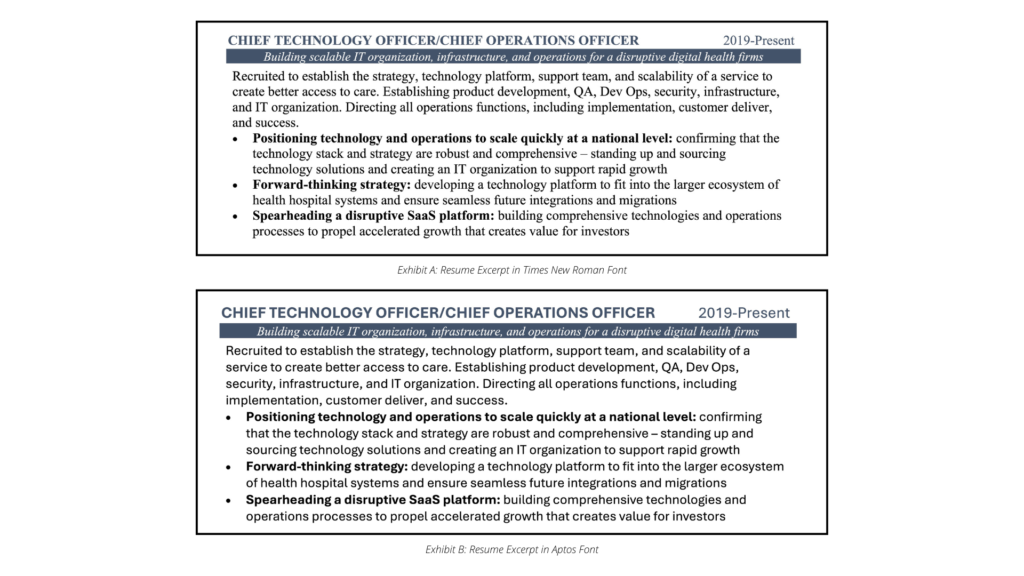At Briefcase Coach, we’ve observed significant shifts in hiring trends and the job market throughout 2024. As a result, we continuously refine our approach to executive resume writing.
The executive job market has always been competitive, but this year brought unique nuances that demanded a fresh approach to resume writing. At Briefcase Coach, our team of expert resume writers and career strategists are constantly analyzing these shifts to ensure our clients stay ahead of the curve. Here’s what we learned in 2024:
When Writing an Executive Resume, Human Skills Reign Supreme
It’s easy to get caught up in the buzz around technical skills and the latest technologies. However, this year has strongly emphasized the enduring importance of human-centric skills – those essential soft skills that enable effective leadership and collaboration.
Caitlin Weaver, seasoned talent management professional and a Briefcase Coach Senior Executive Resume Writer, has observed a significant increase in the prominence of “Data-Driven Decision Making” and “Cross-Functional Collaboration” on executive resumes. These skills, she notes, are highly sought-after across all industries and roles. They underscore the demand for leaders who can effectively synthesize information, foster teamwork, and drive strategic initiatives.
“Data-Driven Decision Making and Cross-Functional Collaboration are highly sought-after skills across all industries.”
Caitlin Weaver, Senior Executive Resume Writer
Incorporating these soft skills into your resume can make a significant difference in showcasing your value to potential employers. Common soft skills to include on your resume include: communication, emotional intelligence, adaptability, and problem-solving. Remember, it’s not just about what you know but also how effectively you can collaborate, communicate, and lead in today’s dynamic work environment.
Beyond the C-Suite: A Shift in Executive’s Titles
While traditional C-suite roles remain prevalent, we’ve observed a shift in the types of roles executives are pursuing. Briefcase Coach’s Steven Gaultney, a specialist in resumes for those in the sustainability sector, has noticed an increase in titles that include “Sustainability”, “Partnerships”, and “Risk”. This pattern indicates a rise in collaborative leadership, social responsibility, and strategic foresight.
The sustainability job market is rapidly expanding, driven by the increasing focus on climate change and environmental justice. According to The Environmental Defense Fund, it has grown by nearly 40%.
ESG (Environmental, Social, and Governance) concerns, increased regulatory scrutiny, and the growing importance of stakeholder engagement are now top priorities for companies. As a result, they are seeking leaders with proven experience in areas like renewable energy, carbon emissions reduction, and sustainable supply chain management.
The Rise of “Strategic Partnership Roles”
Nicole Eshelbrenner, Lead Executive Resume Writer and Instructor, has recognized an important development: the rise of “Strategic Partnerships” roles. This highlights the growing importance of external collaborations and ecosystem building as crucial business growth and innovation strategies.
In today’s interconnected business landscape, companies need to cultivate strategic partnerships in order to gain a competitive advantage, expand their market reach, and access resources or expertise. Hiring leaders with the skills to identify, nurture, and manage these partnerships effectively is becoming increasingly important.
A variety of open roles found on LinkedIn such as Chief Growth Officer, Director of Business Development and Ecosystem Partnership Manager were all targeting a new hire with skills in strategic partnerships. Additional skills for this type of position include relationship management, negotiation, etc.
Increased Flexibility in Job Titles
Lindsay Koons, former Senior Vice President and Senior People Strategist within the Human Capital Strategy and Insights practice at Truist Financial serves as one of Briefcase Coach’s Career Strategists. Throughout her conversations with clients, she has observed a trend toward greater flexibility in executives’ mindsets regarding job titles. Some clients are open to lateral or even lower positions, prioritizing stability and new opportunities in today’s dynamic market.
This adaptability reflects a proactive mindset. Executives recognize that a lateral move can be a stepping stone to future advancement. By expanding their skill set and gaining diverse experience, these executives are positioning themselves for long-term career growth and success.
Style Matters: Modern and Eye-Catching
Aesthetics play a crucial role in executive resumes. Lindsay Koons describes the prevailing preference is for a “modern, sleek, conservative” look. “Clean breaks between roles and shading to make it easier on the eye.” However, subtle innovations can make a resume stand out.
For instance, Briefcase Coach’s legal narrative expert Susannah Khayat recommends considering use of a contemporary font like Aptos for a fresh feel. Additionally, both Susannah and Nicole also say don’t shy away from incorporating bold color choices. By doing so, executive jobseekers can create a visually engaging resume that captures attention. Remember, your resume is a marketing document, and its visual appeal can significantly impact a recruiter’s first impression.

Navigating Executive Resume Writing in the AI Revolution
No conversation about the future of work is complete without addressing the transformative impact of AI. It’s become a critical skillset for executives across all industries. As Susannah points out “AI, encompassing machine learning and IoT, is a must-have keyword.” Nicole adds that executives in technology, especially, must demonstrate their understanding and experience with AI.
According to the 2024 Work Trend Index Annual Report, a significant majority of employees believe AI skills are essential for career advancement. Specifically, 76% see AI skills as necessary to stay competitive, 69% for securing promotions, and 79% for expanding their job opportunities.
Be Proactive with Staying Current
It’s not just about listing buzzwords. Simply mentioning AI on your resume is not enough in today’s competitive market. Instead, showcase your ability to leverage AI technologies. Provide specific examples of how you’ve used these technologies to drive results, innovate, and achieve strategic objectives.
We’ve also observed a significant trend among executives, particularly in technology, to pursue formal education in AI. An overwhelming majority of the executives we’ve spoken with this year have obtained AI certificationsfrom Stanford and MIT.
Leaders are demonstrating a strong commitment to staying ahead of the curve by proactively acquiring the relevant skills to enhance their job search efforts.
By being proactive, these leaders are demonstrating a strong commitment to staying ahead of the curve and acquiring the necessary skills to navigate the AI-driven workplace.
Including your AI skills in a relatable and quanitfiable way, jobseekers position themselves as a forward-thinking leaders. This demonstrates to companies they are able to navigate the complexities of the AI-driven workplace.
The Briefcase Coach Difference
These insights represent just a fraction of the knowledge and expertise our team brings to every client engagement. We don’t simply react to trends; we anticipate them. Our goal is to empower executives and aspiring leaders with career documents that not only reflect their accomplishments but also positions them for success in the ever-evolving executive landscape.
Ready to take your career to the next level? Contact Briefcase Coach today and let our expert team help you craft a resume that tells your unique story and captures the attention of top recruiters.

